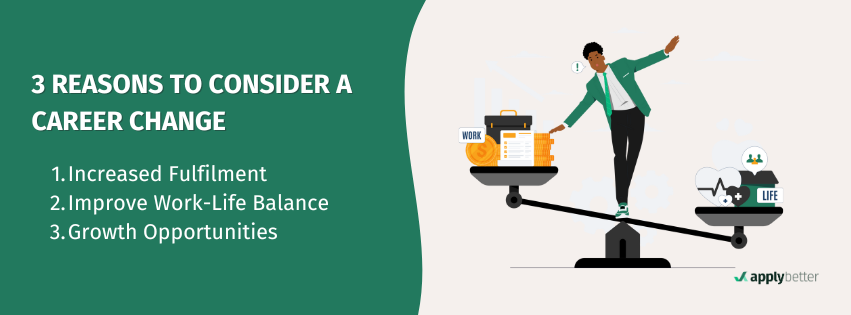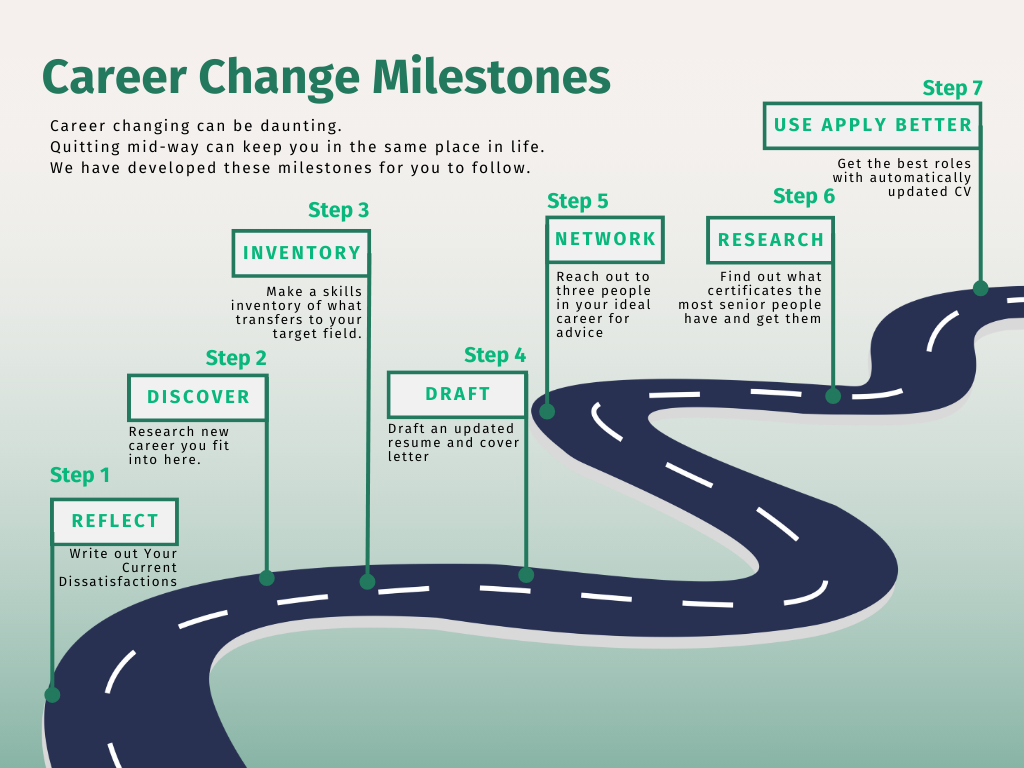TL;DR
Changing careers is daunting but often necessary for growth and fulfillment. Common fears include ageism, sunk costs, restarting from scratch, lack of time, and uncertainty.
- Examine your motivation - career changes allow passion pursuit, better work-life balance, and purpose alignment. Overcome fears through planning, skill transfer, and upskilling.
- Research new fields, negotiate conditions like part-time transition, get training/certifications, tap into your network, and apply transferable skills to stand out.
- Start with informational interviews, side gigs, and freelancing to test the waters. Update your resume/cover letters, practice interviews, and create an action plan.
On average, we spend a third of our days at work. We need to ensure that our work can put us in positive frames of mind. When it doesn’t a career change might be the solution. Changing careers can be a daunting prospect, especially for mid-level employees. The thought of stepping into the unknown, leaving behind a familiar environment, and starting anew can stir up significant fear and self-doubt. However, overcoming this fear is possible with the right mindset and the simple strategy we will give you at the end of this article.
Here’s what we’ll cover in this article:
- I'm too old to change careers, it's too late
- I've sunk time and money into my current career
- I'll have to be a junior again and start from scratch
- I don't have time to make a career change
- Career changes come with so much uncertainty.
3 Reasons to Consider a Career Change

A career transition can seem overwhelming, but staying stagnant often leads to dissatisfaction. Here are three common motivators for making the leap:
- Increased Fulfilment: Perhaps you fell into your current career by chance or the job no longer provides any satisfaction, but you dream of doing something you're genuinely excited about. A career change allows you to align your work with your interests, passions and/or values.
- Improve Work-Life Balance: If endless work hours, frequent travel, or other aspects of your role negatively impact your personal life, switching careers can help you strike a better balance and reduce burnout.
- Growth Opportunities: Stagnation can be demotivating. A new career path can offer fresh challenges and opportunities for professional development.
Common Excuses when Changing Careers and Overcoming Them
Fear often breeds inaction, so it's important to confront apprehensions about switching careers head-on:
a. "I'm too old to change careers, it's too late.": Age is just a number - Many successful people have made significant career changes later in life. Your experience is hugely valuable, and transferable skills will differentiate you. Keep in mind that time will pass regardless. In 10 years, you'd be 10 years older, whether or not you make changes to your career.
Strategy: If you have an idea of what new direction you’d like to transition to, make a list of the transferable skills and experiences that you have that would be needed in the the new role to ease the transition. You’ll find that you’re not too far off.
b. "I've sunk time and money into my current career.": The sunk cost fallacy - you can't get that investment back by staying put. Consider this a chance for a fresh start aligned with your current goals and values. Focus on future potential rather than past investments.
c. "I'll have to be a junior again and start from scratch.": While you may start at a lower position, your prior experience fast-tracks your advancement. Focus on transferring relevant skills to leapfrog ahead.
d. "I don't have time to make a career change.": The issue is that the time will still pass and staying in the same position won’t stop the flow of time. Remember that small steps can lead to big changes.
Strategy- Start with night classes or weekend freelancing before making a full transition to test the waters.
e. "Career changes come with so much uncertainty.": Nothing worthwhile comes easy - embrace the unknown!
Strategy: Identify what it is you’re terrified of and make a plan to reduce that fear. Make a financial plan, do your research, get training, and tap your network to mitigate risks.
Next Steps for Changing Careers
- Self Assessment- Identify fields that fit your interests through self-assessment exercises and informational interviews in target industries. Take our "Career Change Fit" assessment to get personalized recommendations.
- Research- After identifying what roles you can transition to, discover what skills the highest-paid person in that role have and note your skill gaps.
- Get Qualified- Develop critical skills through courses, certifications, volunteering, freelancing, internships, or entry-level jobs. Update your resume with an accomplishments-focused format.
- Leverage Your Network- Tap connections for advice, job leads, warm intros, and referrals. Share your career change goals widely to open new doors.
- Small Steps: Take small, manageable steps towards your new career, such as freelance work or part-time studies.
- Negotiate a Transition- Explore options like going part-time while pursuing training, or having your employer cover education costs via tuition reimbursement.
Deciding if and what career change is right for you?
Take our "Career Change Fit" assessment to get personalized recommendations.
What You Should Do Right Now

A career transition won't happen overnight - start taking small steps today:
- Reflect on Your Current Dissatisfaction: Write down what makes you unhappy in your current role and what scares you about. Making a change.
- Discover what new career you fit into here.
- Make a skills inventory of what transfers to your target field.
- Draft an updated resume and cover letter explaining your motivations. See our article on CV here.
- Reach out to three people in your ideal career for advice and insider perspectives.
- Research any required education, certifications, or credentials.
- Use our software here at Apply Better to hunt down the best jobs
Don't let fear hold you back from greater satisfaction and growth. Commit to making incremental progress toward your dream career.





